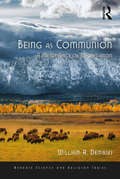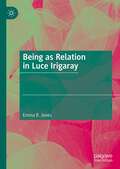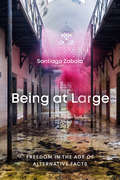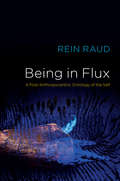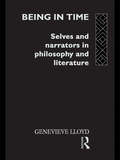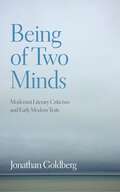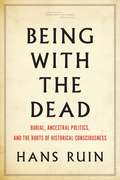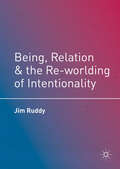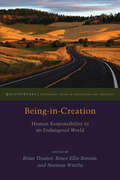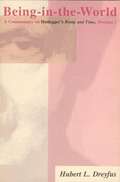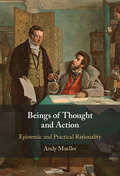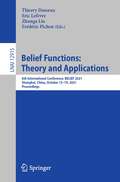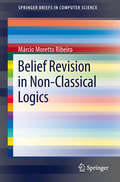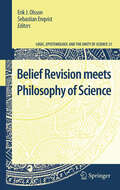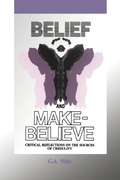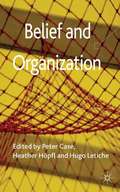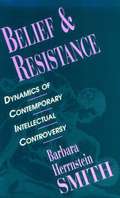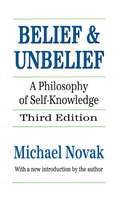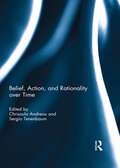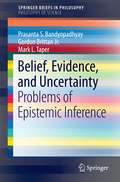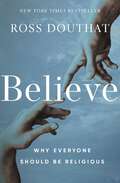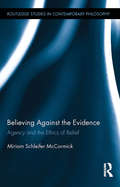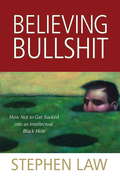- Table View
- List View
Being as Communion: A Metaphysics of Information (Routledge Science and Religion Series)
by William A. DembskiFor a thing to be real, it must be able to communicate with other things. If this is so, then the problem of being receives a straightforward resolution: to be is to be in communion. So the fundamental science, indeed the science that needs to underwrite all other sciences, is a theory of communication. Within such a theory of communication the proper object of study becomes not isolated particles but the information that passes between entities. In Being as Communion philosopher and mathematician William Dembski provides a non-technical overview of his work on information. Dembski attempts to make good on the promise of John Wheeler, Paul Davies, and others that information is poised to replace matter as the primary stuff of reality. With profound implications for theology and metaphysics, Being as Communion develops a relational ontology that is at once congenial to science and open to teleology in nature. All those interested in the intersections of theology, philosophy and science should read this book.
Being as Relation in Luce Irigaray
by Emma R. JonesMany scholars have struggled with Irigaray’s focus on sexuate difference, in particular with her claim that it is “ontological,” wondering if this implies a problematically naïve or essentialist account of sexuate difference. As a result, the ethical vision which Irigaray elaborates has not been taken up in a robust way in the fields of philosophy, feminism, or psychoanalysis.By tracing the notion of relation throughout Irigaray’s work, this book identifies a rigorous philosophical continuity between the three self-identified “phases” in Irigaray’s thought (despite some critics’ concerns that there is a discontinuity between these phases) and clarifies the relational ontology that underlies Irigaray’s conceptualization of sexuate difference – one that always already implies an ethical project.The text demonstrates that an understanding of Irigaray’s Heideggerian inheritance – especially prominent in her later texts – is essential to grasping the sense of the idea that sexuate difference is ontological – it concerns Being, rather than beings. This book further develops potential applications of this ontological notion of a “relational limit” for the fields of philosophy, feminism, and psychotherapy.
Being at Large: Freedom in the Age of Alternative Facts
by Santiago ZabalaPoliticians and philosophers presenting themselves as the ultimate bearers of truth and reality have created unprecedented technological, cultural, and political framings. This new order conspires to undermine the interpretive practices of open-ended critique, normalizing a sense of threat to preserve control. The greatest emergency has become the absence of emergencies. Tracing an intellectual alliance between academics such as Jordan Peterson and Christina Hoff Sommers and right-wing populist politicians such as Donald Trump and Marine Le Pen, this book denounces framings that make a claim to objectivity. With the help of contemporary thinkers including Bruno Latour, Judith Butler, and Giorgio Agamben, as well as discussion of the Cambridge Analytica whistleblower Christopher Wylie and the emergency of biodiversity loss due to climate change, Santiago Zabala illustrates that the twenty-first-century question is not whether we can be free, but how to be at large - unconstrained by the new realist order. Being at Large demonstrates the anarchic power of hermeneutics, calling for interpretive disruptions of the authoritarian narrative as a way of reclaiming freedom in the age of alternative facts.
Being at Large: Freedom in the Age of Alternative Facts
by Santiago ZabalaPoliticians and philosophers presenting themselves as the ultimate bearers of truth and reality have created unprecedented technological, cultural, and political framings. This new order conspires to undermine the interpretive practices of open-ended critique, normalizing a sense of threat to preserve control. The greatest emergency has become the absence of emergencies. Tracing an intellectual alliance between academics such as Jordan Peterson and Christina Hoff Sommers and right-wing populist politicians such as Donald Trump and Marine Le Pen, this book denounces framings that make a claim to objectivity. With the help of contemporary thinkers including Bruno Latour, Judith Butler, and Giorgio Agamben, as well as discussion of the Cambridge Analytica whistleblower Christopher Wylie and the emergency of biodiversity loss due to climate change, Santiago Zabala illustrates that the twenty-first-century question is not whether we can be free, but how to be at large - unconstrained by the new realist order. Being at Large demonstrates the anarchic power of hermeneutics, calling for interpretive disruptions of the authoritarian narrative as a way of reclaiming freedom in the age of alternative facts.
Being in Flux: A Post-Anthropocentric Ontology of the Self
by Rein RaudReality exists independently of human observers, but does the same apply to its structure? Realist ontologies usually assume so: according to them, the world consists of objects, these have properties and enter into relations with each other, more or less as we are accustomed to think of them. Against this view, Rein Raud develops a radical process ontology that does not credit any vantage point, any scale or speed of being, any range of cognitive faculties with the privilege to judge how the world ‘really’ is. In his view, what we think of as objects are recast as fields of constitutive tensions, cross-sections of processes, never in complete balance but always striving for it and always reconfiguring themselves accordingly. The human self is also understood as a fluctuating field, not limited to the mind but distributed all over the body and reaching out into its environment, with different constituents of the process constantly vying for control. The need for such a process philosophy has often been voiced, but rarely has there been an effort to develop it in a systematic and rigourous manner that leads to original accounts of identity, continuity, time, change, causality, agency and other topics. Throughout his new book, Raud engages with an unusually broad range of philosophical schools and debates, from New Materialism and Object-Oriented Ontology to both phenomenological and analytical philosophy of mind, from feminist philosophy of science to neurophilosophy and social ontology. Being in Flux will be of interest to students and scholars in philosophy and the humanities generally and to anyone interested in current debates about realism, materialism and ontology.
Being in Time: Selves and Narrators in Philosophy and Literature (Ideas)
by Genevieve LloydGenevieve Lloyd's book is a provocative and accessible essay on the fragmentation of the self as explored in philosophy and literature. The past is irrevocable, consciousness changes as time passes: given this, can there ever be such a thing as the unity of the self? Being in Time explores the emotional aspects of the human experience of time, commonly neglected in philosophical investigation, by looking at how narrative creates and treats the experience of the self as fragmented and the past as 'lost'. It shows the continuities, and the contrasts, between modern philosophic discussions of the instability of the knowing subject, treatments of the fragmentation of the self in the modern novel and older philosophical discussions of the unity of consciousness. Being in Time combines theoretical discussion with human experience: it will be valuable to anyone interested in the relationship between philosophy and literature, as well as to a more general audience of readers who share Augustine's experience of time as making him a 'problem to himself'.
Being of Two Minds: Modernist Literary Criticism and Early Modern Texts
by Jonathan GoldbergBeing of Two Minds examines the place that early modern literature held in Modernist literary criticism. For T. S. Eliot, Virginia Woolf, and William Empson, the early modern period helps model a literary future. At stake in their engagements across time were ontological questions about literature and its ability to mediate between the one and the many, the particular and the general, life and death, the past and the present. If reading and writing literature enables the mind to be in two places at once, creative experience serves as a way to participate in an expanded field of consciousness alongside mortality.Goldberg reads the readings that these modernists performed on texts that Eliot claimed for the canon like the metaphysical poets and Jacobean dramatists, but also Shakespeare, Milton, Montaigne, and Margaret Cavendish. Ontological concerns are reflected in Eliot’s engagement with Aristotle’s theory of the soul and Empson’s Buddhism. These arguments about being affect minds and bodies and call into question sexual normativity: Eliot glances at a sodomitical male-male mode of literary transmission; Woolf produces a Judith Shakespeare to model androgynous being; Empson refuses to distinguish activity from passivity to rewrite gender difference.The work of one of our leading literary and cultural critics, Being of Two Minds spans centuries to show how the most compelling and surprising ideas about mind, experience, and existence not only move between early modernity, high modernism, and our own moment, but are also constituted through that very movement between times and minds.
Being with the Dead: Burial, Ancestral Politics, and the Roots of Historical Consciousness (Cultural Memory in the Present)
by Hans RuinPhilosophy, Socrates declared, is the art of dying. This book underscores that it is also the art of learning to live and share the earth with those who have come before us. Burial, with its surrounding rituals, is the most ancient documented cultural-symbolic practice: all humans have developed techniques of caring for and communicating with the dead. The premise of Being with the Dead is that we can explore our lives with the dead as a cross-cultural existential a priori out of which the basic forms of historical consciousness emerge. Care for the dead is not just about the symbolic handling of mortal remains; it also points to a necropolitics, the social bond between the dead and living that holds societies together—a shared space or polis where the dead are maintained among the living. Moving from mortuary rituals to literary representations, from the problem of ancestrality to technologies of survival and intergenerational communication, Hans Ruin explores the epistemological, ethical, and ontological dimensions of what it means to be with the dead. His phenomenological approach to key sources in a range of fields gives us a new perspective on the human sciences as a whole.
Being, Relation, and the Re-worlding of Intentionality
by Jim RuddyIn this book, Jim Ruddy has proceeded deep into the hub-center of Husserl's transcendental subjectivity and unearthed an utterly new phenomenological method. A vast, originative a priori science emerges for the reader. Ruddy presents a unique and powerful eidetic science wherein the object consciousness of Husserl is suddenly shown to point beyond itself to the ultimate theme of the pure subject consciousness of God as He is in Himself. Thus, the book opens up an endlessly new, unrestricted realm of objective material for phenomenology to exfoliate and describe. This is an important work for both general phenomenologists and for scholars of Husserl, Aquinas, and Edith Stein.
Being-in-Creation: Human Responsibility in an Endangered World (Groundworks: Ecological Issues in Philosophy and Theology)
by Bruce Ellis Benson Norman WirzbaWhat is the proper relationship between human beings and the more-than-human world? This philosophical question, which underlies vast environmental crises, forces us to investigate the tension between our extraordinary powers, which seem to set us apart from nature, even above it, and our thoroughgoing ordinariness, as revealed by the evolutionary history we share with all life.The contributors to this volume ask us to consider whether the anxiety of unheimlichkeit, which in one form or another absorbed so much of twentieth-century philosophy, might reveal not our homelessness in the cosmos but a need for a fundamental belongingness and implacement in it.
Being-in-the-World: A Commentary on Heidegger's Being and Time Division I
by Hubert L. DreyfusDreyfus's approach to this daunting book is straightforward and pragmatic. He explains the text by frequent examples drawn from everyday life, and he skillfully relates Heidegger's ideas to the questions about being and mind that have preoccupied a generation of cognitive scientists and philosophers of mind.
Beings of Thought and Action: Epistemic and Practical Rationality
by Andy MuellerIn this book, Andy Mueller examines the ways in which epistemic and practical rationality are intertwined. In the first part, he presents an overview of the contemporary debates about epistemic norms for practical reasoning, and defends the thesis that epistemic rationality can make one practically irrational. Mueller proposes a contextualist account of epistemic norms for practical reasoning and introduces novel epistemic norms pertaining to ends and hope. In the second part Mueller considers current approaches to pragmatic encroachment in epistemology, ultimately arguing in favor of a new principle-based argument for pragmatic encroachment. While the book defends tenets of the knowledge-first programme, one of its main conclusions is thoroughly pragmatist: in an important sense, the practical has primacy over the epistemic.
Belief Functions: 6th International Conference, BELIEF 2021, Shanghai, China, October 15–19, 2021, Proceedings (Lecture Notes in Computer Science #12915)
by Frédéric Pichon Thierry Denœux Eric Lefèvre Zhunga LiuThis book constitutes the refereed proceedings of the 6th International Conference on Belief Functions, BELIEF 2021, held in Shanghai, China, in October 2021. The 30 full papers presented in this book were carefully selected and reviewed from 37 submissions. The papers cover a wide range on theoretical aspects on mathematical foundations, statistical inference as well as on applications in various areas including classification, clustering, data fusion, image processing, and much more.
Belief Revision in Non-Classical Logics (SpringerBriefs in Computer Science)
by Márcio Moretto RibeiroSince the advent of the Semantic Web, interest in the dynamics of ontologies (ontology evolution) has grown significantly. Belief revision presents a good theoretical framework for dealing with this problem; however, classical belief revision is not well suited for logics such as Description Logics. Belief Revision in Non-Classical Logics presents a framework which can be applied to a wide class of logics that include - besides most Description Logics such as the ones behind OWL - Horn Logic and Intuitionistic logic, amongst others. The author also presents algorithms for the most important constructions in belief bases. Researchers and practitioners in theoretical computing will find this an invaluable resource.
Belief Revision meets Philosophy of Science (Logic, Epistemology, and the Unity of Science #21)
by Sebastian Enqvist Erik J OlssonBelief revision theory and philosophy of science both aspire to shed light on the dynamics of knowledge - on how our view of the world changes (typically) in the light of new evidence. Yet these two areas of research have long seemed strangely detached from each other, as witnessed by the small number of cross-references and researchers working in both domains. One may speculate as to what has brought about this surprising, and perhaps unfortunate, state of affairs. One factor may be that while belief revision theory has traditionally been pursued in a bottom- up manner, focusing on the endeavors of single inquirers, philosophers of science, inspired by logical empiricism, have tended to be more interested in science as a multi-agent or agent-independent phenomenon.
Belief and Make-Believe
by George Albert WellsWhy do so many people - sometimes even intelligent people - swallow the preposterous claims of religion? G.A. Wells, the leading freethinker of our time, tries to shed light on this puzzle in his entertaining and enormously learned book, Belief and Make-Believe.Professor Wells begins by analyzing the nature of belief. To dispel popular confusions on the relation between words and thoughts, he compares the thinking process of scientists, laymen, and chimpanzees.The power of emotion and instinct to help form people's ideological outlooks is analyzed by preference to "defiance" and "reliance", polar attitudes which arise from the need for dominance and submission in primate groups. Wells shows the influence of defiance and reliance in patriotism and in monotheistic religions, where submission to the will of the omnipotent is a wonderful technique for feeling secure in the face of life's actual and ineradicable dangers.Since the knowledgeable Christians now accept that the Bible is uneven, unreliable, and sometimes morally abhorrent, and that the New Testament account of the origin of Christianity is mostly legend, various attempts have been made to save something from the debris by selective re-interpretation. Wells evaluates several typical examples, showing how the apologists shrink from the clear implications of their arguments, which would demolish the whole edifice of Christian doctrine.Finally, Professor Wells debunks some of the extravagant and mystical claims that have been made for the arts, notably poetry, as quasi-religious vehicles for gaining insights into the human condition.
Belief and Organization
by Peter Case Hugo Letiche Heather HöpflExamines the alternative belief systems which contemporary organizational actors live by and through which they seek to find meaning within the dominant (neo)capitalist social order. This volume marks an attempt to move the study of belief forward within management and organization studies.
Belief and Resistance: Dynamics of Contemporary Intellectual Controversy
by Barbara H. SmithThe controversies between traditionalists and postmodernists are the topic of this book. It examines questions at the heart of the debate, such as: truth, reason, and objectivity - can we survive without them? What happens to law, science and the persuit of justice when these ideals are abandoned? The clash of belief and skepticism, and our need for intellectual stability are also examined.
Belief and Unbelief: A Philosophy of Self-knowledge
by Michael NovakThis is perhaps the most widely read of Michael Novak's books. Belief and Unbelief attempts to push intelligence and articulation as far as possible into the stuff of what so many philosophers set aside as subjectivity. It is an impassioned critique of the idea of an unbridgeable gap between the emotive and the cognitive � and in its own way, represents a major thrust at positivist analysis.Written in a context of personal tragedy as well as intellectual search, the book is grounded in the belief that human experience is enclosed within a person to person relationship with the source of all things � sometimes in darkness, other tunes in aridity, but always in deep encounter with community and courage. It is written with a deep fidelity to classical Catholic thought as well as a sense of the writings of sociology, anthropology, and political theory�from Harold Lasswell to Friedrich von Hayek.This third edition includes Novak's brilliant 1961 article "God in the Colleges" from Harper's � a critique of the technification of university life that rules issues of love, death, and personal destiny out of bounds, and hence leaves aside the mysteries of contingency and risk, in favor of the certainties of research, production, and consumption. For such a "lost generation" Belief and Unbelief will remain of tremendous interest and impact.When the book first appeared thirty years ago, it was praised by naturalists and religious thinkers alike. Sidney Hook called it "a remarkable book, written with verve and distinction." James Collins termed it "a lively and valuable essay from which a reflective, religiously concerned reader can draw immense profit." And The Washington Post reviewer claimed that "Novak has written a rich, relentlessly honest introduction to the problem of belief. It is a deeply personal book, rigorous in argument and open ended in conclusions."
Belief, Action, and Rationality over Time
by Chrisoula Andreou and Sergio TenenbaumAction theorists and formal epistemologists often pursue parallel inquiries regarding rationality, with the former focused on practical rationality, and the latter focused on theoretical rationality. In both fields, there is currently a strong interest in exploring rationality in relation to time. This exploration raises questions about the rationality of certain patterns over time. For example, it raises questions about the rational permissibility of certain patterns of intention; similarly, it raises questions about the rational permissibility of certain patterns of belief. While the action-theoretic and epistemic questions raised are closely related, advances in one field are not always processed by the other. This volume brings together contributions by scholars in action theory and formal epistemology working on questions regarding rationality and time so that researchers in these overlapping fields can profit from each other’s insights. This book was originally published as a special issue of the Canadian Journal of Philosophy.
Belief, Evidence, and Uncertainty: Problems of Epistemic Inference (SpringerBriefs in Philosophy #0)
by Prasanta S. Bandyopadhyay Gordon Brittan Jr. Mark L. TaperThis work breaks new ground by carefully distinguishing the concepts of belief, confirmation, and evidence and then integrating them into a better understanding of personal and scientific epistemologies. It outlines a probabilistic framework in which subjective features of personal knowledge and objective features of public knowledge have their true place. It also discusses the bearings of some statistical theorems on both formal and traditional epistemologies while showing how some of the existing paradoxes in both can be resolved with the help of this framework. This book has two central aims: First, to make precise a distinction between the concepts of confirmation and evidence and to argue that failure to recognize this distinction is the source of certain otherwise intractable epistemological problems. The second goal is to demonstrate to philosophers the fundamental importance of statistical and probabilistic methods, at stake in the uncertain conditions in which for the most part we lead our lives, not simply to inferential practice in science, where they are now standard, but to epistemic inference in other contexts as well. Although the argument is rigorous, it is also accessible. No technical knowledge beyond the rudiments of probability theory, arithmetic, and algebra is presupposed, otherwise unfamiliar terms are always defined and a number of concrete examples are given. At the same time, fresh analyses are offered with a discussion of statistical and epistemic reasoning by philosophers. This book will also be of interest to scientists and statisticians looking for a larger view of their own inferential techniques. The book concludes with a technical appendix which introduces an evidential approach to multi-model inference as an alternative to Bayesian model averaging.
Believe: Why Everyone Should Be Religious
by Ross DouthatAn Instant <b>New York Times Bestseller</b> "Truly a Mere Christianity for the 21st century"--World magazine <p> Do you ever wish you had more faith? Here is a blueprint for thinking your way from doubt to belief. As a columnist for the New York Times who writes often about spiritual topics for a skeptical audience, Ross Douthat understands that many of us want to have more faith than we do. Douthat argues that in light of what we know today it should be harder to not have faith than to have it. With empathy, clarity, and rigor, Douthat explores: Why nonbelief requires ignoring what our reasoning faculties tell us about the world. How modern scientific developments make a religious worldview more credible, not less. Why it's entirely reasonable to believe in mystical and supernatural realities. How an open-minded religious quest should proceed amid the diversity of religious faiths. How Douthat's own Christianity is informed by his blueprint for belief. <p> With clear and straightforward arguments, Believe shows how religious belief makes sense of the order of the cosmos and our place within it, illuminates the mystery of consciousness, and explains the persistent reality of encounters with the supernatural. Highly relevant for our current moment, Believe offers a pathway for thinking your way from doubt into belief, from uncertainty about our place in the universe into a confidence that we are here for a reason.
Believing Against the Evidence: Agency and the Ethics of Belief (Routledge Studies in Contemporary Philosophy)
by Miriam Schleifer McCormickThe question of whether it is ever permissible to believe on insufficient evidence has once again become a live question. Greater attention is now being paid to practical dimensions of belief, namely issues related to epistemic virtue, doxastic responsibility, and voluntarism. In this book, McCormick argues that the standards used to evaluate beliefs are not isolated from other evaluative domains. The ultimate criteria for assessing beliefs are the same as those for assessing action because beliefs and actions are both products of agency. Two important implications of this thesis, both of which deviate from the dominant view in contemporary philosophy, are 1) it can be permissible (and possible) to believe for non-evidential reasons, and 2) we have a robust control over many of our beliefs, a control sufficient to ground attributions of responsibility for belief.
Believing Bullshit
by Stephen LawWacky and ridiculous belief systems abound. Members of the Heaven's Gate suicide cult believed they were taking a ride to heaven on board a UFO. Muslim suicide bombers expect to be greeted after death by 72 heavenly virgins. And many fundamentalist Christians insist the entire universe is just 6,000 years old. Of course it's not only cults and religions that promote bizarre beliefs. Significant numbers of people believe that aliens built the pyramids, that the Holocaust never happened, and that the World Trade Center was brought down by the US government. How do such ridiculous views succeed in entrenching themselves in the minds of sane, intelligent, college-educated people and turn them into the willing slaves of claptrap? How, in particular, do the true believers manage to convince themselves that they are the rational, reasonable ones and that everyone else is deluded? This book identifies eight key mechanisms that can transform a set of ideas into a psychological flytrap. The author suggests that, like the black holes of outer space, from which nothing, not even light, can escape, our contemporary cultural landscape contains numerous intellectual black-holes--belief systems constructed in such a way that unwary passers-by can similarly find themselves drawn in. While such self-sealing bubbles of belief will most easily trap the gullible or poorly educated, even the most intelligent and educated of us are potentially vulnerable. Some of the world's greatest thinkers have fallen in, never to escape. This witty, insightful critique will help immunize readers against the wiles of cultists, religious and political zealots, conspiracy theorists, promoters of flaky alternative medicines, and various other nutcases by clearly setting out the tricks of the trade by which such insidious belief systems are created and maintained.
Believing Bullshit
by Stephen LawThis book identifies eight key mechanisms that can transform a set of ideas into a psychological flytrap. The author suggests that, like the black holes of outer space, from which nothing, not even light, can escape, our contemporary cultural landscape contains numerous intellectual black-holes--belief systems constructed in such a way that unwary passers-by can similarly find themselves drawn in. While such self-sealing bubbles of belief will most easily trap the gullible or poorly educated, even the most intelligent and educated of us are potentially vulnerable. Some of the world's greatest thinkers have fallen in, never to escape. This witty, insightful critique will help immunize readers against the wiles of cultists, religious and political zealots, conspiracy theorists, promoters of flaky alternative medicines, and various other nutcases by clearly setting out the tricks of the trade by which such insidious belief systems are created and maintained.From the Trade Paperback edition.
